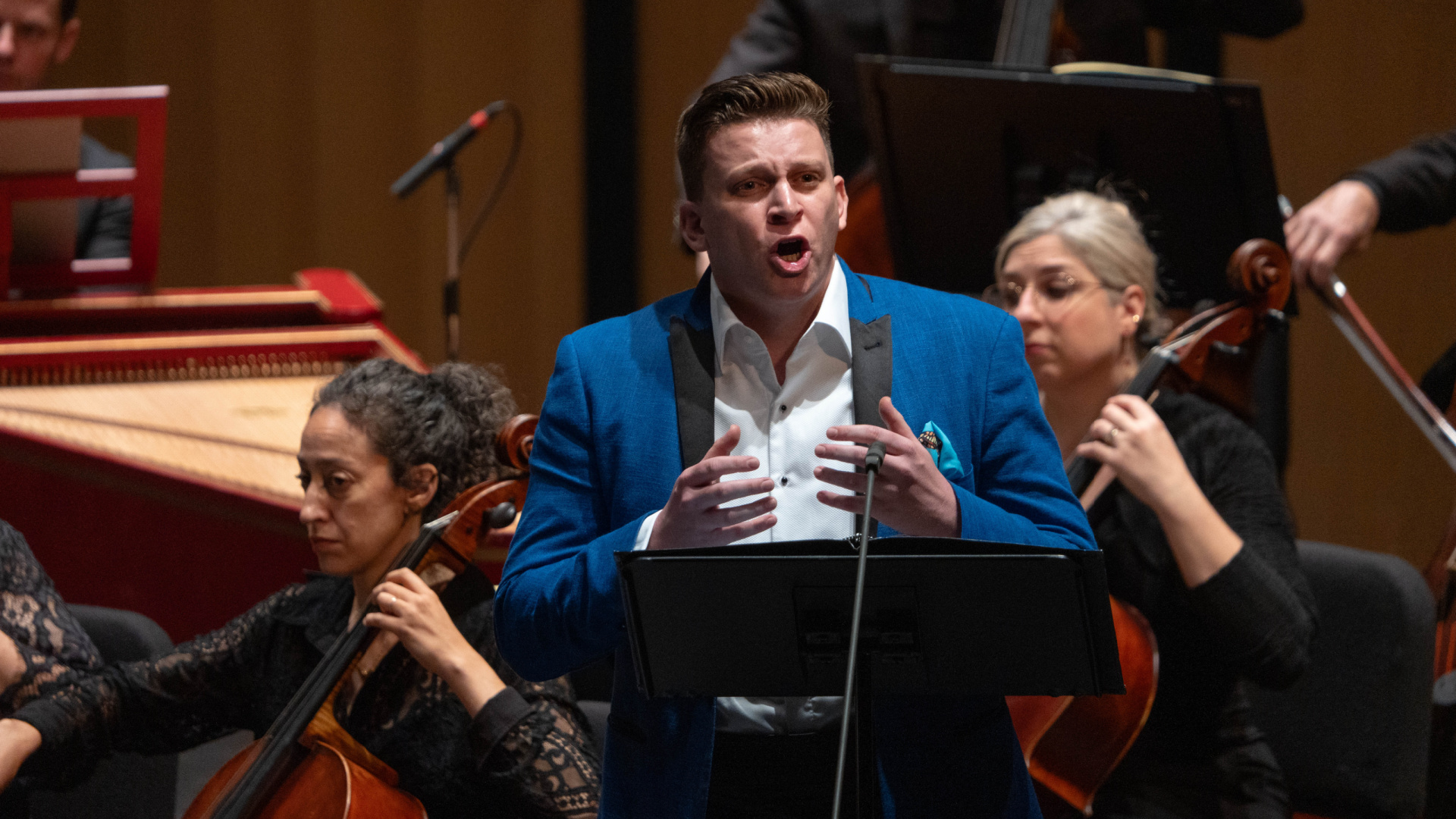“Orfeo” in excelsis: Outstanding singers open MOB season in dramatic style
September 16, 2025

Countertenor Aryeh Nussbaum Cohen sings in Music of the Baroque’s performance of Gluck’s Orfeo ed Euridice Monday night at the Harris Theater. Photo: Elliot Mandel
In recent years Music of the Baroque has traditionally opened a new season with a big vocal showpiece, presenting such works as Haydn’s The Creation, Handel’s Jephtha, and Mozart’s Requiem.
To launch 2025-26, Dame Jane Glover led her MOB forces in a more intimate work, Christoph Willibald Gluck’s Orfeo ed Euridice Monday night at the Harris Theater.
Gluck’s 1762 opera draws upon the tragic Greek myth of the musician Orpheus who descends to the lower regions to restore to life his deceased wife Euridice. He is allowed to rescue her provided he does not look upon her until they are out of the underworld. Orpheus cannot resist her anguished entreaties, however, and after he gazes on her, she returns to death.
Gluck’s lean, 90-minute setting remains a unique achievement and a milestone in opera. In addition to tweaking the scenario to provide a happy ending, Gluck brought a new and straightforward simplicity with Orfeo ed Euridice, sweeping away excesses of the French baroque, and focusing on the essential drama at the heart of the story. Glover opted for the streamlined original Vienna version, with some sensible edits and conflation of elements of the later French version.
Orfeo is the dominant presence in this three-singer work and Monday night’s successful performance at the Harris Theater benefited greatly from having countertenor Aryeh Nussbaum Cohen make his role debut as the bereaved Orfeo.
Since his Chicago debut with the Newberry Consort in 2017, the American countertenor’s career has been on a fast ascent. He has gone from strength to strength in subsequent local appearances including MOB’s aforementioned Jephtha in 2022 and a CSO Handel program last season.
Monday night’s performance likewise benefited from going beyond the standard sit, stand, deliver, and sit again tropes of concert opera. Indeed the more overtly theatrical approach by the cast made for a surprisingly fiery and dramatic account of an opera that often presented in a historically minded, low-key style.
From his first entrance, Cohen was fully in character as the grief-stricken Orpheus—walking slowly to the front of the stage, sitting and burying his face in his hands and keeping them there for several minutes as he sang his opening music.
Cohen’s countertenor instrument is a wonder—uncommonly rich in tone, evenly projected throughout its range and able to surmount all technical hurdles. At times in Act I one wanted a more varied and specific expression amid the prevailing mournful melancholy.
But in his first assumption of this challenging role, Cohen was largely quite impressive, singing his arias with pure and mellifluous tone. He brought plaintive, dynamically shaded vocalism to his rendering of “Chiamo il mio ben cosi,” and made “Che faro senza”—the opera’s most celebrated moment—not just a rapt and moving highlight but the dramatic peak of the entire opera.

Heidi Stober in MOB’s Orfeo ed Euridice. Photo: Elliot Mandel
Euridice is a short and thankless role. with the character of Orpheus’s not-alive wife not even entering the stage until the final act. She then goes in seconds from intense relief and love to despair and hatred, haranguing Orpheus for his refusal to look at her like an eschatological Mrs. Bickerson.
Heidi Stober commanded the stage in the opera’s last half-hour, singing Euridice with full tone and striking dramatic intensity. Her emotional performance brought credible depth to this underdeveloped character, making the couple’s confrontation genuinely compelling rather than just absurd. As the distressed Euridice, Stober collapsed to the Harris stage floor and lay there motionless in her elegant evening gown for several minutes while Cohen sang Orfeo’s famous aria. Purists may posit that such a quasi-verismo approach takes Gluck’s opera out of period but there was no arguing with the effective results.
In this fast company, Hannah De Priest held her own as Amore, singing vibrantly and with an aptly bright and youthful tone.
After a somewhat fussy Overture, Glover’s direction was virtually faultless, with MOB’s longtime music director drawing convincing, subtly varied tempos in a work dominated by slow music. She also brought great vitality to the devilish underworld music and a buoyant lift to the joyous finale.
The orchestra playing was vivid throughout with violent string accents in the underworld music. The conductor also artfully spotlit the chalumeau—the clarinet’s predecessor—and Zachary Good’s atmospheric playing added a striking, woody timbral color to the orchestral palette.
Under the direction of Andrew Megill, the MOB Chorus performed at its usual standard of excellence. At times one wanted more fluent section blending in the early going, but the ensemble brought snarling relish to the Furies and clarion jubilance to the final chorus.
Nicholas Kraemer leads Music of the Baroque in Bach’s Brandenburg Concertos (minus No. 5), 3 p.m. October 12 at the North Shore Center in Skokie and 7:30 p.m. October 13 at the Harris Theater.

Jane Glover conducted Music of the Baroque in Gluck’s Orfeo ed Euridice Monday night. Photo: Elliot Mandel